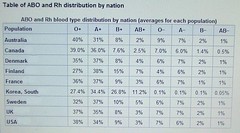I was thinking the other day about the leaps and bounds made in medical science since my Granny's day. In the 40s if you were a woman with a negative blood group and your partner had a positive one, nothing could be done. If you had a child together and its blood type was negative, life was just great. If you had a child together and its blood group was positive, the effect was worse than devastating. With less than 15% of the population in general being rhesus negative, there isn't an enormous problem, however it seems to be a recurrent problem in my family.
My dad was the first child of a negative mother and positive father, my dad's blood type is O+. The result changed his life forever. His siblings, two I think, died at birth, their red blood cells destroyed by the blood that had passed into his negative mother during his own birth.
When my parents met, once again the problem arose - mum is AB-, dad is positive. They were taken into a quiet room in the hospital during her first pregnancy and told the devastating news that because of rhesus incompatibility which had been worked on a little since the 40s, their chances of having more than nine live births were zero! Nine? Mum and dad laughed aloud and told the doctor they had been planning a football team! ;-) But seriously, in the 60s, people in that situation would have a first healthy baby followed by increasingly sickly ones until the stillbirths kicked in. Mum and dad were luckier than Granny and Granda. Their first child, me, was born with rhesus negative blood, assuring their second child would be healthy whether negative or positive and they didn't have a third.
Then history repeated itself once more. When I married André, I found out he too had O+, against my B-. Fortunately, being very aware of rhesus problems from family history I enquired straight away about the implications. In the 90s, it was treated by giving anti-D if bleeding, miscarriage or amniocentesis took place and after birth the baby's own blood group was checked and you were given a further anti-D shot within 12 hours should your baby turn out to be rhesus positive. By 2005 when I had Léon, this had been increased to offering rhesus negative women anti-D shots every 4-6 weeks through pregnancy whether or not any bleeding or fluid exchange had taken place. By the end of each of my pregnancies I was so full of anti-D I was fit to burst. And my kids: Marcel B-, Charlotte O-, Léon B-, of course!!! It is devastatingly ironic though that nowadays when we have all this knowledge and technology to combat rhesus disease, I manage to produce only rhesus negative children which would have been unaffected by the invention or not of anti-D and would have survived just as well in the 40s, while my poor grandmother had only positive children back in the days when the doctors couldn't save them. Life's a bitch at times :-(
Anyway, I thought this table was interesting:  It brings home to me just how rare I, my kids (and my mum) are and explains I guess that the chances of me having all these negative babies was very slim. It also reminded me to give blood when I can (I can't at the moment because they won't touch you when you are breast-feeding). And more than anything else it underlined to me why I should refuse if the work ever tries to send me to South Korea on business ;-) I certainly don't fancy my chances there, should I have an accident and need a transfusion!
It brings home to me just how rare I, my kids (and my mum) are and explains I guess that the chances of me having all these negative babies was very slim. It also reminded me to give blood when I can (I can't at the moment because they won't touch you when you are breast-feeding). And more than anything else it underlined to me why I should refuse if the work ever tries to send me to South Korea on business ;-) I certainly don't fancy my chances there, should I have an accident and need a transfusion!
Glad to hear you saying you're happy to Give Blood ,.,. Your mum might need you some day ?
ReplyDeleteLook at this sad article from tosmorning's paper.
http://www.theherald.co.uk/email/Ea3ssV8/AkASG/jump.html
Not ideal though given I am not the same bloodtype - can only really help out my boys.
ReplyDeleteAnd now you're doing it again (I'm A+). Do women in your family have an obsession with positive blood? :-/
ReplyDelete